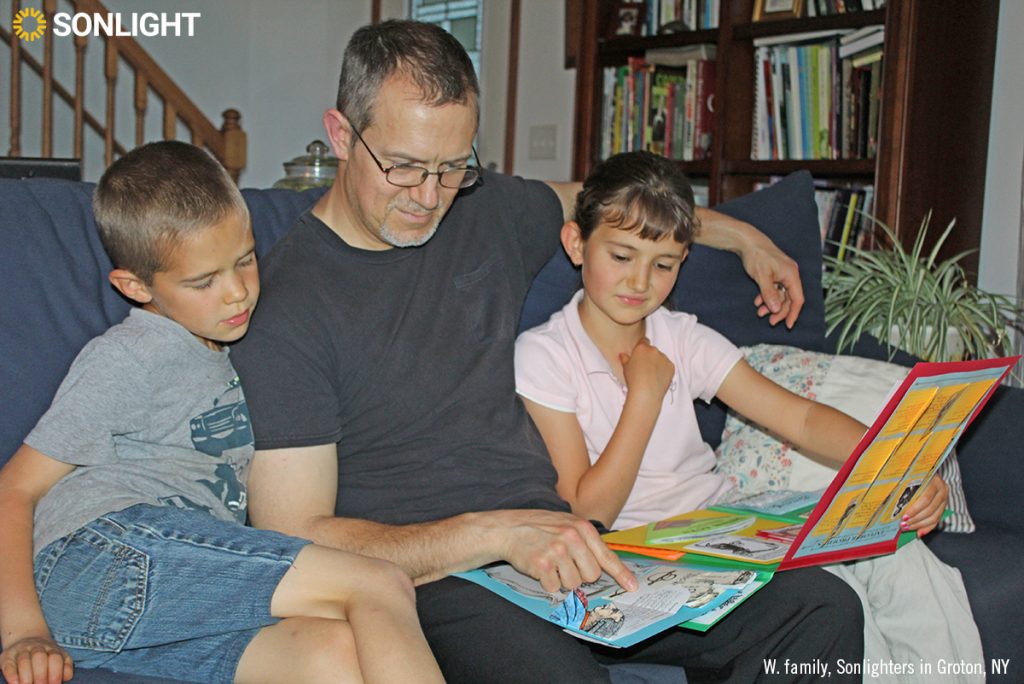
Have you ever read a book you couldn't stop thinking about? I keep returning to Nurture Shock because it has challenged some of my assumptions about child development.
Take race relations, for example. Popular thought goes something like this: We can raise our children to be color-blind if we just put them in diverse environments and never talk about race.
But does that really work?
The authors of Nurture Shock say it doesn't. Instead, they present convincing evidence from many studies to show that even young children do notice skin color.
I admit that as parents, we can be very uncomfortable talking about race. I am even a touch hesitant to write about it, lest I unintentionally/needlessly offend. In their research, co-authors Po Bronson and Ashley Merryman pick up on parents' extreme hesitance to talk about this issue.
In particular, they note that white parents tend to feel especially uncomfortable talking about race. Perhaps parents seek to avoid any hint of prejudice by simply never mentioning skin color. But we do our children a disservice by remaining mute on the issue. Our children need us to help them make sense of their world in so many other arenas … why not race, too?
Children Are Not Color-blind
Have you noticed that children have a driving need to categorize and organize their world? As the Bronson notes, "Children categorize everything from food to toys to people at a young age." And it appears children categorize by skin color as well.
For example, researchers tested three-year-olds by displaying photographs of other children and asking whom they would like to have as friends. A stunning 86% of the white children chose photographs of other white children. When those same children were five and six, researchers gave them a small deck of cards and asked them to divide the cards into two piles any way they wished. While 16% sorted by gender and 16% used other factors (such as age), 68% of the children sorted the cards by race. Even at six months old (through a fascinating study I don't have time to explain here), children were naturally attuned to race differences. Researcher Dr. Phyllis Katz concluded "At no point in the study did the children exhibit the Rousseau-type of color-blindness that many adults expect."
Since children notice these categories during their most formative years, it follows that we should help them understand what they see.
Here are some pointers from the book:
1. Parents should not just drop hints about racial equality. We should talk about it explicitly.
When parents want to teach their children about racial equality, they tend to say things like "God made everyone equal." But Bronson's findings show such vague statements don't convey much meaning to kids. They don't translate into the concrete messages we want our kids to embrace.
So instead, we can say things more explicitly, such as: "God made people with different skin colors. He loves all of us, no matter what color our skin is or where we come from. Our family also loves people who are black, brown, white and anywhere in between!"
2. As kids generalize in order to understand their own identity, they may say things about race that make you cringe.
This doesn't mean they'll grow up to be racist, but it does mean you have a great opportunity to teach.
When Bronson's young son, Luke, began asserting that his favorite basketball player on TV was the one "with skin like us," Bronson kept talking with Luke until he got to the bottom of the issue. It turns out that Luke was self-conscious about his hair, which looked so different than the black players' hair-styles. I like how Bronson sums it up: "My son was looking for his own identity, and looking for role models. … I dealt with these moments explicitly, telling my son it was wrong to choose anyone as his friend, or his favorite, on the basis of their skin color or even their hairstyle. We pointed out how certain friends wouldn't be in our lives if we picked friends for their color. He got the message, and over time he not only accepted but embraced this lesson. Now he talks openly about equality and the wrongfulness of discrimination."3. Merely placing children in proximity with children of other races doesn't seem to help unite races.
Bronson says that the more diversity there is in a public high school, the more the students will self-segregate by race. Unless there are specific initiatives to help children think constructively about race relations and form cross-racial friendships, the pressure to fit in with one's own ethnic group trumps.
In their research of many scientific studies, Bronson and Merryman found that merely putting children in situations where they encounter other races isn't enough. Parents need to talk about the fact that we can be friends and interact with people of other races just as we would with people who happen to have the same skin color as we do.4. Books about race relations can help children understand their world more appropriately.
Bronson didn't spend much time on this point, but I of course found it fascinating! And it reinforced what I already knew: literature helps open up important conversations you need to have with your children.I have found that to be true in my own family. It never crossed my mind that I needed to talk to my children to let them know that just as girls can grow up to be doctors and engineers, so too can Blacks, Native Americans, Whites and Hispanics. But, my children grew up with clear understandings of racial issues.
I believe this is because we studied so many cultures around the world and did not shy away from difficult racial issues. As the children grew, we simply read, discussed and were deeply impacted by Sonlight books we shared, such as:
Why do I think reading is a huge key to helping raise children who don't judge others based on race? Read more here.
If you're as intrigued as I am by these reflections on race relations and child development, I'd suggest you track down a copy of Nurture Shock. Perhaps you'll find the whole book as interesting as I did.
As parents, may we be purposeful in imparting to our children all of our heritage and raising them with a right understanding. Let's help our kids make sense of this fascinating world God created.







I found this article interesting as we are looking into fostering children from different races. But aside from that I have to relate this story....My eighteen year old daughter's best friend is black....actually bi-racial. Anyway....she's been a part of our family for a couple of years now. For her birthday she wanted to spend it with us, so she invited her 20 something sister to join us for the night. We had a usual birthday bash as if she were a part of our family.....which by the way included reading aloud!! The next morning my 8 year old son went on and on about how he couldn't see the older sister on the couch because she blended in so well.....we have a brown leather couch. While my teenage girls kept cringing at his remarks...he was in no way trying to offend and he was stating what he saw. The sister was laughing and was fine with his assessments. She felt like she was a part of the family....and that suited her just fine!
Fantastic post Sarita! Thanks so much for sharing... You've added yet another book to my evergrowing list of "must reads"!
~Jenny
Thank you, Sarita. Very timely for me! We are white suburbanites, and we recently took a day trip to Chicago, where my 7-year-old noted that "there are a lot of black people!" And yes, I felt uncomfortable with his calling attention to the issue, but realized I needed to talk with him about it just as I do any other cultural issue we notice when we're out and about in the world. Yes, they notice, and it's up to us to help them know how to think about the differences.
But why would 'Color Blind' even be the goal? Of COURSE children, and the rest of us, notice skin color and other outward differences. The goal should then be to train children and everyone else to respect all the other humans and our various and sundry differences that make us unique! We need to get over the sensitivities of being called 'black' or 'white' or 'brown' or whatever, because that is just a quick visual description----such as we would describe a book or a cat. We have 3 cats----one orange tabby, one brown tabby and one white and gray siamese mix----each with unique personalities, each with different colored eyes and fur but they are ALL still cats! If I said to a person I didn't know, "Look how cute Ophelia is", the next logical question is "Which one is Ophelia?" The answer obviously is "The White and Grey mix!" Why would I launch into a description of every other feature of my cat to try and make the stranger understand which cat it is by ignoring the obvious clear answer for easy identification----COLOR? Why do humans have such a hard time accepting our various outward colors and differences?? It's a question for the ages I guess. But I think it's really silly to make color-blindness our ultimate goal----because it's unrealistic and silly. Respect and common sense acceptance that we are all part of the human race is what all colors of human skin should strive for :)
Color-blind is a joke. My daughter was only 3 when she referred to someone "with the darker skin." They notice... we have to address it!
Thank you Sarita, it is a deep thought-provoking article. It is a sensitive and rather taboo subject...in our world.
I am 1/2 Northern Cheyenne of MT living all my life in a close state and grew up white prior 1973 ICWA ....the bias is very difficult and often blindsides a person out of the blue...
This is so very true. Here in South Africa, race is an especially sensitive topic. My 4yr old girl told me the other day that our house-helper was black. So I spoke to her about how God made people different but we are all His children etc. But a funny little thing: She then said but she saw her feet and she is turning white!
I had an inward chuckle but explained to her that is just the way God made her and there is nothing wrong with it. It doesn't matter what color your are etc. And no, she's not turning white.